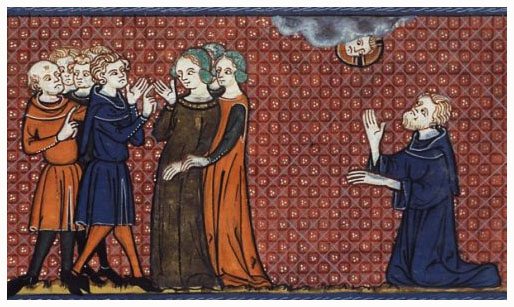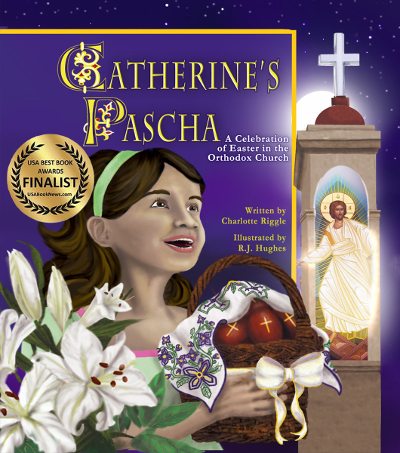Everyone agreed that the courtesan Margarita was beautiful. She was also smart and ambitious. She knew how to make men want her, and she knew how to make them pay for their desire.
And so she became wealthy. She covered her body – the parts she chose to cover – in cloth of gold and pearls and precious stones. Even her slaves, who accompanied her everywhere, wore lavish clothing and golden torcs around their necks.
And so men sought her out, attracted by her beauty and her wealth. But she knew that none of those men wanted her. They wanted her beauty. They wanted her body. But they didn’t know who she was; they didn’t even know her name. Not her real name. But they didn’t care. Not as long as she would sell them what they wanted.
Beauty and Virtue
When she went about the city of Antioch, Margarita wanted to show the men of Antioch what they wanted. So before she set out, she made herself perfect. It took hours. When she was done, she gleamed and shimmered. She showed her bare head, her bare shoulders. She enticed.
And when the monks and clergy saw her, they looked away. They might be monks, but they were still men. Her beauty and her brazenness affected them, too.
Most of them, anyway. Bishop Nonnus saw her, and he didn’t turn away. He didn’t see a body. He saw a person, one who had worked diligently, persistently. And he admired that in her. “We could learn from this woman,” he told his brother monks. “She works harder to make her body beautiful than we do to make our souls virtuous.”
And Bishop Nonnus began to pray for the courtesan Margarita.
Margarita Receives Back Her Name
It wasn’t long afterward that the courtesan Margarita heard Bishop Nonnus preaching. He spoke of sin and virtue and God’s judgment. And as she listened, she understood. The men who came to her had never wanted her. And she had never wanted them.
She sent her slaves to bishop Nonnus, asking to be baptized. He refused at first, wanting assurance that she would truly change her life. She gave him no assurance. Instead, she told him that, if he didn’t baptize her and instruct her, then God would hold him accountable for all of her sins at the last judgment.
That was enough for Bishop Nonnus. He found a godmother for Margarita, a deaconess named Romana. And he baptized her. And when he baptized her, he took the name Margarita away from her and gave her a new name. He restored to her her real name, the name her parents had given her when she was born. She was again Pelagia.
And Pelagia found that she no longer wanted her great wealth. So she had her steward inventory her belongings, and she brought them to Bishop Nonnus to distribute to the poor. She freed her slaves. She studied the faith with her godmother.
But there were still men who wanted Margarita. So Pelagia did the only sensible thing she could do. She became a person that men wouldn’t want. She became the monk Pelagius.
The Monk in Jerusalem
Pelagia left Antioch and went to Jerusalem. She found a cave near the Mount of Olives, where she lived as a recluse, Pelagius. She spent her time praying and fasting.
It’s possible that she had told Bishop Nonnus her plan before she left Antioch, because three or four years later, he sent Deacon James to visit his friend, the monk Pelagius.
Deacon James visited twice. On the second visit, he found that the monk Pelagius had died. That was when he and everyone else learned that the monk Pelagius was a woman.
The local bishops were apparently found this news disconcerting. They tried to hush things up, and they buried her in her cell. But it wasn’t possible to silence her story, and her cell became a place of pilgrimage.
And some remember her as St. Pelagia of Antioch, and some remember her has St. Pelagia the Penitent. And some remember her still as St. Pelagia the Righteous.
Apolytikion of St. Pelagia the Righteous
The image of God, was faithfully preserved in you, O Mother.
For you took up the Cross and followed Christ.
By Your actions you taught us to look beyond the flesh for it passes,
rather to be concerned about the soul which is immortal.
Wherefore, O Holy Pelagia, your soul rejoices with the angels.
Read More
Venerable Vitalis, Patron of Prostitutes: Vitalis left his monastery and moved to Alexandria. He got a job, and started visiting prostitutes. But it wasn’t what everyone thought.
The Emerald of God, St. Euphrosyne of Alexandria: Euphrosyne didn’t want to marry the man her father had picked out for her. So she gave away all her wealth, took the name Smaragdos, or Emerald, and became a monk.
In This Family, We Don’t Judge: Judging others is easy. But the saints teach us what it means to live without judging.
Buy the Books!

These delightfully diverse books provide disability representation (Elizabeth, one of the main characters, is an ambulatory wheelchair user). They also give Orthodox Christian children the rare opportunity to see themselves in books, and children who are not Orthodox the chance to see cultural practices they may not be familiar with.
Catherine’s Pascha
FINALIST IN THE 2015 USA BEST BOOK AWARDS
Catherine doesn’t like vegetables. She doesn’t like naps. She doesn’t like it when her mom combs her hair. She loves hot dogs, chocolate cake, and her best friend, Elizabeth. Most of all, she loves Pascha! Pascha, the Orthodox Christian Easter, is celebrated in the middle of the night, with processions and candles and bells and singing. And Catherine insists that she’s not a bit sleepy.
Celebrate the joy of Pascha through the magic of a book: Catherine’s Pascha. Available on Amazon, Bookshop.org, and my webstore.
The Saint Nicholas Day Snow
Shoes or stockings? Horse or sleigh? Does St. Nicholas visit on December 6 or on Christmas Eve? Will a little girl’s prayer be answered? When Elizabeth has to stay at Catherine’s house, she’s worried about her grandmother, and worried that St. Nicholas won’t find her. The grownups, though, are worried about snow.
Celebrate the wonder of St. Nicholas Day through the magic of a book: The Saint Nicholas Day Snow. Available on Amazon, Bookshop.org, or my webstore.



